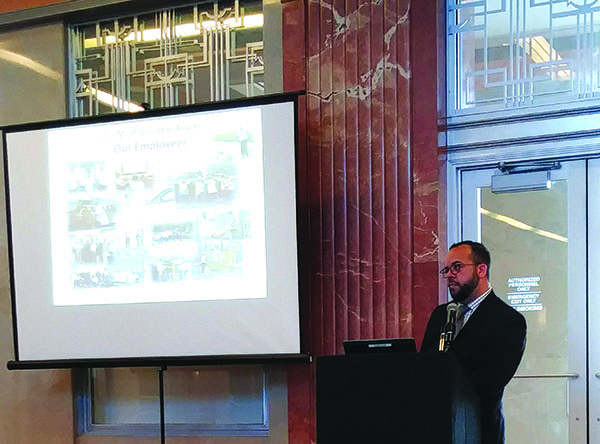Catch basins, oversight discussed at hurricane preparedness town hall

Senator Jean-Paul Morrell speaks at a town hall hosted at the New Orleans Lakefront Airport, located on 6001 Stars and Stripes Boulevard. Photo credit: Jamal Melancon
August 23, 2017
The city’s recent flooding events served as a backdrop for featured officials and community members to discuss the state of the city’s storm preparedness at a meeting earlier this month.
The town hall meeting, organized by Senator Jean-Paul Morrell, focused on clogged catch basins and $22 million for future oversight granted to the Sewerage and Water Board.
In light of the flooding that occurred July 22 and Aug. 5, Morrell prefaced the meeting by asking what the city’s flood protection would be like if a hurricane were to come.
“I realized the public has not been as educated necessarily on a regular basis, as far as what is the current status of our coastal restoration, flood protection,” Morrell said at the meeting at Lakefront Airport on Aug. 17. “I reached out to the various authorities that are cast in those roles.”
Ignacio Harrouch, the operations chief of the Coastal Protection and Restoration Authority, and Robert Turner, director of engineering and operations for the Southeast Louisiana Flood Protection Authority-East, both gave brief presentations regarding how their agencies work to maintain the city’s flood and hurricane protection system.
The Coastal Protection and Restoration Authority is a state entity that oversees inspections, operation and maintenance in projects aimed at Louisiana’s coastal protection. Harrouch explained that they can inspect maintenance protocol during construction and provide technical assistance to partners. Turner spoke about the Southeast Louisiana Flood Protection Authority-East’s commitment to an ever-evolving levee system, mentioning their plans for levee lifts and armoring.
After the presentations, audience members focused their questions to the cleaning of stuffed catch basins and the Sewerage and Water Board’s oversight future.
One audience member questioned the planning process of drainage placement in neighborhoods in Gentilly and Lakeview. Morrell answered that those catch basin placements are more frequently involved with individual scenarios between property owners and developers.
“The answer to your question isn’t a great answer because, though there was some input by city agencies, where those drains were put in, they were put in by developers,” Morrell said.
He described the process as becoming “willy-nilly” as years went by. The woman who asked the question responded that the system isn’t working anymore to which Morrell agreed that the catch basin placement process could evolve.
During the meeting, a Sewerage and Water Board representative announced the City Council’s decision to approve the spending of $22 million to address the flaws of the city’s drainage system, such as repairing 15,000 catch basins.
In response, a Pontilly (a combination of Pontchartrain Park and Gentilly) Neighborhood Association board member brought up the intense clogging of catch basins in her neighborhood, to which a Sewerage and Water Board representative responded by assuring her that an official could attend their next monthly meeting in September to investigate.
Morrell followed up saying that the city has a problem with hired contractors illegally littering into catch basins. He said this happens with frequent grass cutting and that this is an issue adding to the flood protection problem.
“People sometimes forget you can only really clean the top of your catch basins. When certain stuff gets clogged below a certain point, you can not clean it yourself,” Morrell said.
Catch basins are the top priority in the effort to improve flood prevention measures across the city, according to Morrell. There are 65,000 catch basins that exist in New Orleans. Local or state legislation is Morrell’s suggestion for a solution to the drainage problem.







